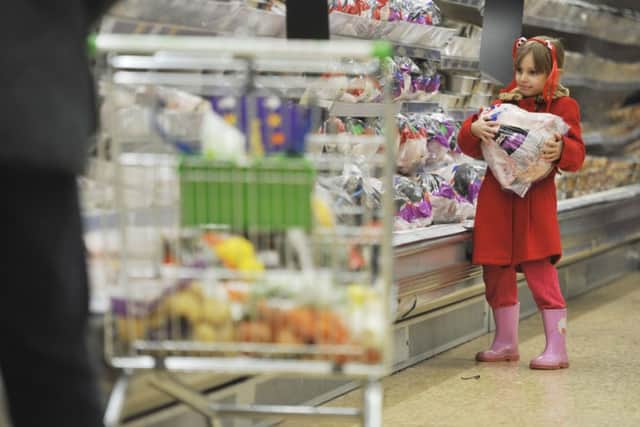Scots food bills among lowest in Europe


Consumers in Scotland also pay 5 per cent less for their basket of supermarket shopping than the European Union average, according to the study Scottish Retail: The Economic and Social Contribution, published by the Scottish Retail Consortium.
The report found that the weekly food shop eats up only 11 per cent of the typical British earnings now, compared with more than one fifth in 1970.
Advertisement
Hide AdAdvertisement
Hide AdFood-price inflation has dropped significantly in the past couple of years as supermarkets cut prices in the battle for customers, while discount brands such as Aldi and Lidl have taken a higher share of the market.
Nine per cent of Scottish businesses are retailers, the report found, with 23,115 retail businesses, employing more than 257,000 people.
The report said that, while consumer confidence in Scotland has continued on an upward trajectory since early 2012, Scottish consumers are more cautious overall than their UK counterparts – meaning they are less likely to splurge when the economic situation improves slightly.
CONNECT WITH THE SCOTSMAN
• Subscribe to our daily newsletter (requires registration) and get the latest news, sport and business headlines delivered to your inbox every morning
Leigh Sparks, professor of retail studies at the University of Stirling, said: “There has undoubtedly been food-price deflation. We have seen the price of products weighed down and fall in a number of categories.
“However, what we also have to remember is that our behaviour has changed. We are now much more about convenience. Coffee shops are a good example – people eat and drink there and they are not included in the shopping basket. We also eat out more at restaurants.”
The report, which has gathered data from the past year, found that the amount of household income spent on food is likely to fall further over the coming 12 months.
The proportion that Scottish households spent on housing, including household bills, has increased substantially from 17 per cent to 22 per cent between 2006 and 2013.
Advertisement
Hide AdAdvertisement
Hide AdAlso, transport now accounts for 16 per cent of total household expenditure.
David Lonsdale, director of the Scottish Retail Consortium, said: “Scotland’s retail industry is dynamic, diverse and exciting. It has over 23,000 shops and provides 257,000 retail jobs, equivalent to 14 per cent of total employment in Scotland.
“Many of our indigenous retail brands are market leaders both domestically or further afield, and millions of Scottish consumers benefit from a quality retail experience each and every day.”
He added: “The sector has faced up to significant structural changes over recent years, and this has tested the business model of every retailer.”
The report found that the UK – including Scotland – is more competitively priced in all retail categories except alcohol and tobacco. Tobacco duty is almost double the level of that in France and Germany, while Britain is one of just a few countries to impose any substantial duty on wine – with the third highest level of the 28 countries in the European Union after Ireland and Finland.
SCOTSMAN TABLET AND IPHONE APPS